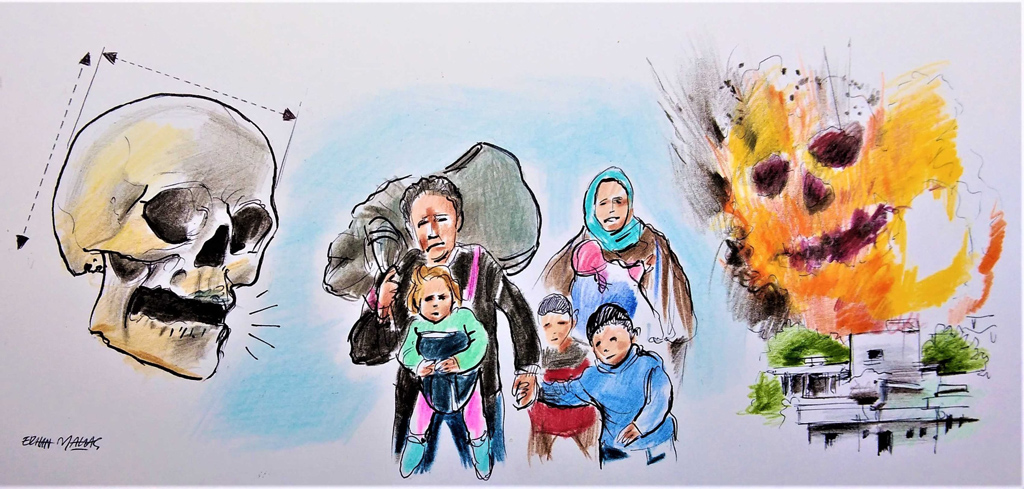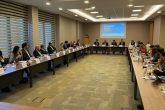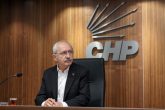It is clear that the question of Syrian refugees, which Turkey has intensely debated for recent weeks now, will be an important item on the agenda for next year’s election. We must find a way to manage that issue without being suffocated by short-term interests nor being dragged into racism and xenophobia, or undermining our humanitarian-democratic culture. To accomplish that goal, it is crucial to remain committed to a rational plan that deals with integration and repatriation together.
Having previously announced his administration’s intention to “repatriate 1 million Syrians,” President Recep Tayyip Erdoğan criticized the main opposition Republican People’s Party (CHP) Chairperson Kemal Kılıçdaroğlu in a more recent address to the business community: “Mr. Kemal, we will watch over our brothers and sisters who fled the war in Syria and sought refuge in our country. We are there – no matter what you say. That is why we’re building those houses (in Syria). They may return to their homeland when they please, but we will never kick them out of this land. Mark my words.” In the same speech, Erdoğan talked about new housing projects inside the safe zones and the fraternity among hosts and guests.
How to facilitate
Having facilitated the voluntary repatriation of some 500,000 Syrian asylum-seekers, the Turkish government pledged to repatriate 1 million more, while stressing that they won’t be “thrown into the lap of murderers.” The opposition and its media outlets, however, cannot seem to properly process that message, claiming that the president has changed his mind. In truth, however, Erdoğan’s approach reflects a mixture of integration and repatriation. Stressing that Turkey won’t “kick out” or “forcibly remove” the Syrian refugees, he pledges to repatriate them in an “honorable” and “voluntary” manner by “building living spaces” in Syria. To watch over asylum-seekers, who have fled the war next door, is a humanitarian duty. To build homes for them in safe zones inside Syria and facilitate their voluntary return, in turn, is a practical policy. In contrast, the opposition’s calls on Syrian refugees to “go home immediately” and pledge to “speak with Bashar Assad” are not realistic. That the opposition leads the Turkish people, who rightfully complain about the refugee burden, to demand immediate repatriation leads to the alienation of asylum-seekers. To prevent acts of violence against the refugee community, a rational and balance discourse is needed. Failure to act accordingly could facilitate the rise of extremist movements targeting foreigners. Unfortunately, an excessive process of alienation is already underway on social media and among some journalists. In truth, anyone with influence over public opinion needs to act with common sense. Otherwise, Turkey could face the threat of violence against Turkish citizens and foreigners – just so that certain populist politicians score political points.
Data on refugees in Turkey
The question, to which the public debate summarily refers as the refugee question, is indeed multi-dimensional. It relates to asylum-seekers as well as illegal immigrants, lawful residents and even tourists. According to the latest date, there are 5.4 million foreign nationals living in Turkey. Some 3.7 million of those foreigners are Syrian nationals under temporary protection. An additional 320,000 individuals pursue international protection. Among those groups, asylum-seekers and illegal migrants are viewed as problem areas. In this sense, Turkey implements a decisive policy of border enforcement and repatriation vis-a-vis illegal migrants from Afghanistan and other places. No concessions ought to be made in that area.
When it comes to the Syrian refugees, a recent study by the Foundation for Political, Economic and Social Research (SETA) found that a little more than half of asylum-seekers did not believe that they would live in Turkey permanently. Some 64% of participants, however, stated that they were unwilling to return to Syria while Assad’s oppression continues. Again, 78% said that they would like to go to a third country. We must accept that some asylum-seekers will stay in Turkey within the framework of an integrated migration policy. In this regard, we must manage integration and repatriation simultaneously. Hence Erdoğan’s occasional references to “returning home” and emphasis on “watching over our Syrian brothers and sisters” – an attempt to preserve social peace and security at home. Recalling the importance of fraternity, he rejects alienation. The CHP, in contrast, tells lies, falsely claiming that asylum-seekers will vote in next year’s election, and engages in dangerous populism. One would expect a social democratic party to make reasonable and humane proposals, including integration – not pave the way to racism.



